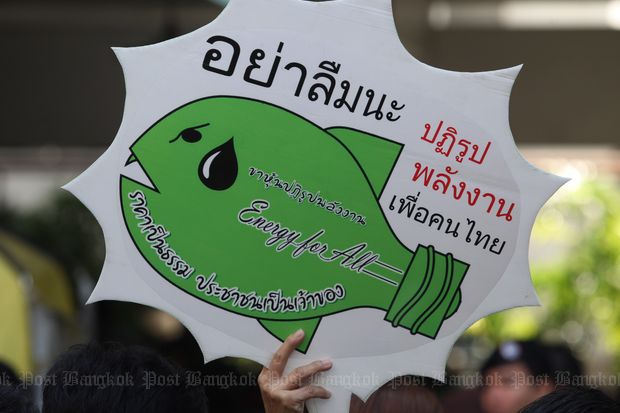
Prime Minister Prayut Chan-o-cha has insisted the government will press ahead with the 21st round of bidding on concessions for oil and gas exploration despite fierce opposition from civic groups.
His remark came after several "big names" signed an open letter calling on the government to suspend the planned bidding out of concerns that the current concession granting system gives only a small share of the profits to the state.
Those who signed the letter include former House speaker Arthit Urairat, former prime minister and Democrat Party leader Abhisit Vejjajiva, former finance minister Thirachai Phuvanatnaranubala, former foreign minister Prasong Soonsiri, and several other civic group leaders. The groups' representatives will submit the letter to Gen Prayut on Monday at Government House.
The groups opposed to the 21st round of bidding suggested the government switch to the production-sharing contract (PSC) system, which they see as more flexible and beneficial to the country.
The 21st round of petroleum and gas exploration covers 29 gas and oil resource blocks, of which 23 are offshore and six onshore. The period for when the government receives bid applications will end on Wednesday after it began on Oct 21 last year.
Gen Prayut said yesterday the bidding process would proceed as planned while authorities would hold talks with critics to settle their differences.
"This doesn't mean I am being stubborn. If [the Energy Ministry's] information is not as solid as theirs, it just isn't. Do you understand what I am saying? They have to fight with facts and figures, not just words with no proof to back them up.
"Then we will see if we can do exploration work by ourselves ... if we have the resources. We need to discuss and resolve this with the opponents [of the planned bidding]," he said.
He said there was still time and ways for authorities and opponents to talk things over.
However, Gen Prayut pointed out that the concessions could be revoked if there are problems, though legal issues could become a concern in such cases.
The government plans to press ahead with the bidding process after Wednesday since exploration work would take five to six years before drilling can begin.
According to the prime minister, there should be a back-up plan if the bidding is delayed and the country's energy supplies are affected.
Energy authorities claim fuel supplies could be drained within five years.
"If it turns out that concessions should not proceed, there must be evidence showing why they can't proceed. If gas prices go up in the future, let us go to court to find out who caused the problem. It is better that way, I think," Gen Prayut said.
According to the civic groups' open letter, those who signed the petition are urging the government to postpone the bidding for no more than two years and during this period it should proceed to amend the petroleum law and regulations to allow better forms of natural resource management such as the PSC system.
They also challenge the authorities to a debate and suggest that a public referendum should be held to decide if the bidding should proceed if the issue cannot be settled. The groups insist fuel supplies will not run out within five years as claimed by policy makers.
Amid the opposition, the Energy Ministry has made some changes to concession bidding criteria.
One is that potential bidders give consent to the Energy Ministry to reveal their bids and related information submitted with them. The other is that if the government decides to adopt the PSC system or any other system in three high-potential offshore blocks — G3/57, G5/57 and G6/57 — the government reserves the right to negotiate with the bidders about changes to be made.
However, the government will use this right within the first four years of the exploration period.
According to Puangthip Silpasart, director-general of the Mineral Fuels Department, Energy Minister Narongchai Akrasanee has signed an amended version of the bidding invitation.
Meanwhile, National Reform Council member Rosana Tositrakul yesterday criticised the Mineral Fuels Department's latest move, saying the proposed PSC system for the three blocks was aimed only at easing pressure.
She said the department failed to specify when a law on the PSC would be promulgated. She noted if the department was serious about adopting the PSC, it would have lobbied for the law's speedy passage.